Written by Grandview Kids parent, Laura
Kabuki syndrome is a rare genetic disorder affecting 1 of every 32,000 births worldwide. Children with Kabuki Syndrome may experience a variety of symptoms, including mild to moderate intellectual impairment, growth delays, low muscle tone, feeding issues, swallowing difficulties, heart defects, cleft palate or other mouth issues, skeletal abnormalities, including hip dysplasia, visual and hearing impairments, autistic behavioural challenges, developmental delay and possible seizures. It is a spectrum disorder, meaning that every child is affected differently, like many genetic disorders.
Henley was born 5 lbs 19 oz with both of his hips dislocated (hip dysplasia) and with two sacral dimples, an ear pit and was hard to feed formula or breast milk. We were told that the signs may be a genetic disorder and something we should test for. He had low blood sugar and, for a short period of time, was in the Neonatal Intensive Care Unit (NICU), where my husband and I visited him and tried to do feeds, which never went very well.

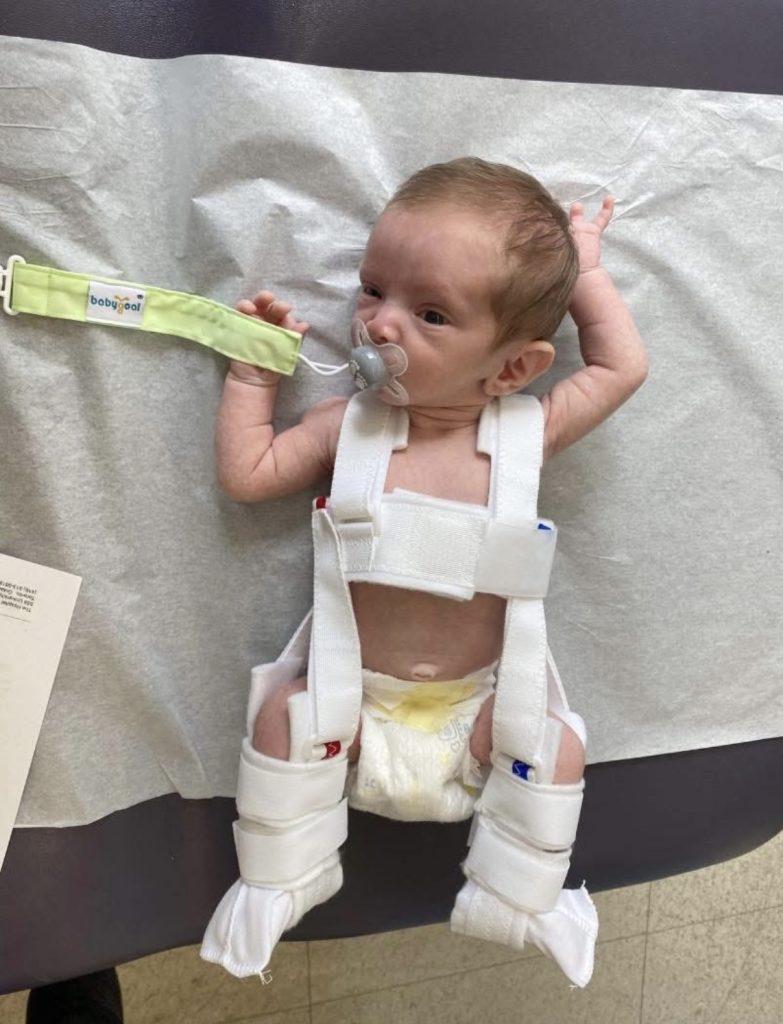
At 2 months old, he was small and still looked like a newborn. He had been vomiting after any formula he managed to ingest and had been diagnosed with reflux. He was placed on two medications for this. He was deemed “failure to thrive” and was admitted to the hospital for daily weight checks, observation and to have a nasogastric (NG) tube inserted for feedings. At age 7 months, he had an inguinal hernia repair, which expedited Henley’s access to a gastrostomy tube (G tube) for feedings. As a mom with a nursing background, I had a really hard time with both, but especially the G tube. It felt so permanent. I felt like I had failed him and didn’t want this for my child.
Grandview Kids has been a big part of our journey and is there for every step. Our social worker here really helped talk us through the diagnosis, the grief associated with this and how it was okay to have all the feelings while still being proud of how far you’ve come from the beginning.
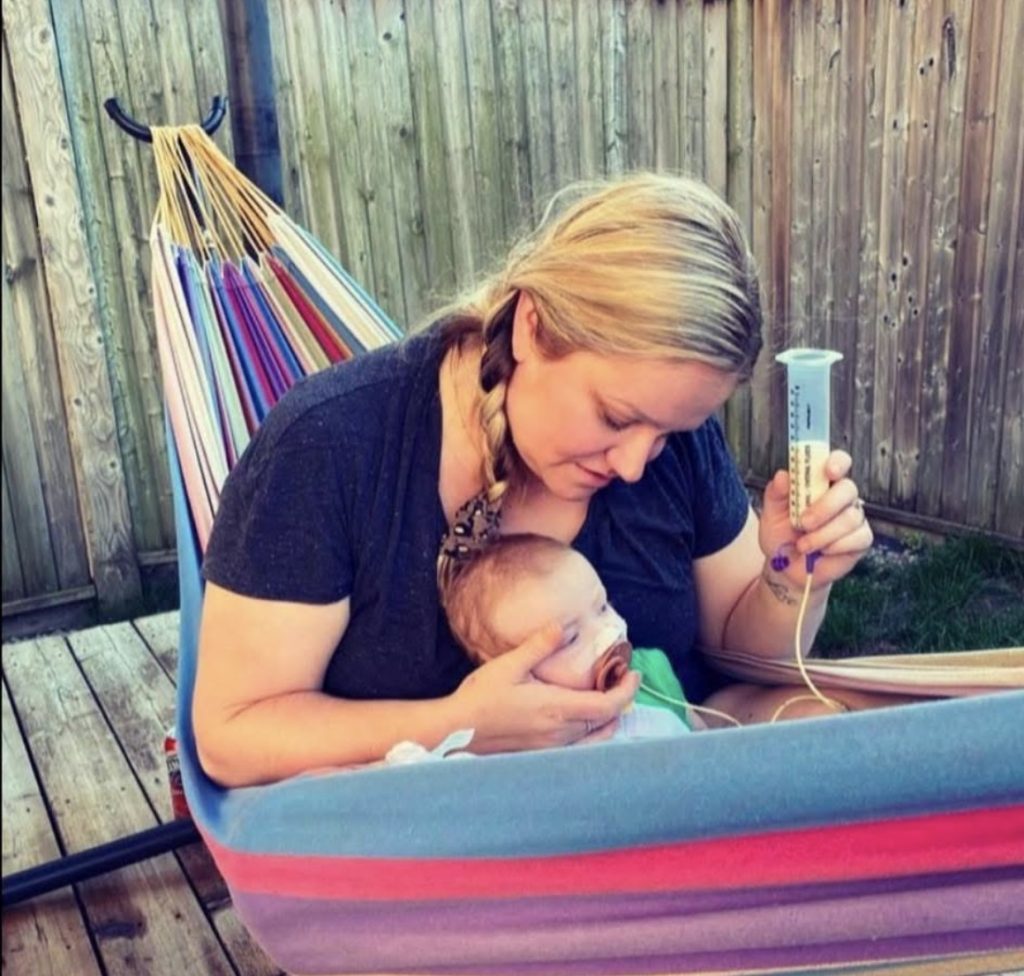
While we struggled with all of this, we underwent testing for genetic disorders. There are two mutations that cause Kabuki syndrome: KMT2D & KDM6A. Weeks later, it came back, and Henley tested positive for the KMT-2D gene. Henley had Kabuki syndrome. After seeing the geneticist, we were referred for early intervention services at Grandview Kids, including participation in the Complex Care Program, delivered in partnership with The Hospital for Sick Children (SickKids), Grandview Kids, Lakeridge Health and the Ontario Health at Home, Central East.
Prior to Henley’s Kabuki syndrome diagnosis, we had already been seeing different specialists at SickKids, primarily orthopaedics, having biweekly ultrasounds and then hip x-rays as he grew. He was placed in a leg brace so we couldn’t bathe or put our baby in pants for months. It was hard, but we were hopeful this would help. It didn’t.
We had Grandview Kids for support through the Complex Care Program, occupational therapy, speech-language pathology, physiotherapy, dietetics, feeding therapy and social work consults throughout Henley’s hurdles. We also travelled to SickKids for many specialist appointments.
For Henley, Kabuki syndrome involved mostly feeding problems, hip dysplasia, low muscle tone as a baby and developmental delay. He missed most milestones. After a swallowing assessment, he was discovered to be mildly aspirating fluids. At this time, we tried to thicken fluids and, as he aged, continued to do swallowing assessment at SickKids radiology, which eventually he was no longer having tracheal aspirations, so we could “try to feed.”
This was terrifying and exciting at the same time. My baby hadn’t had bottles or formula. He started having thickened water and eventually purées. With his G Tube feeds, we would give him opportunities to eat/taste and play orally with food. We did a lot of it by trial and error and just kept going, even when I was nervous. It was a long road, but at 2 years 7 months old, Henley became a feeding tube graduate and was discharged from Grandview Kids’ Complex Care Program. We know this isn’t everyone’s journey, as many Kabuki kids we follow online still have feeding tubes and feeding struggles.
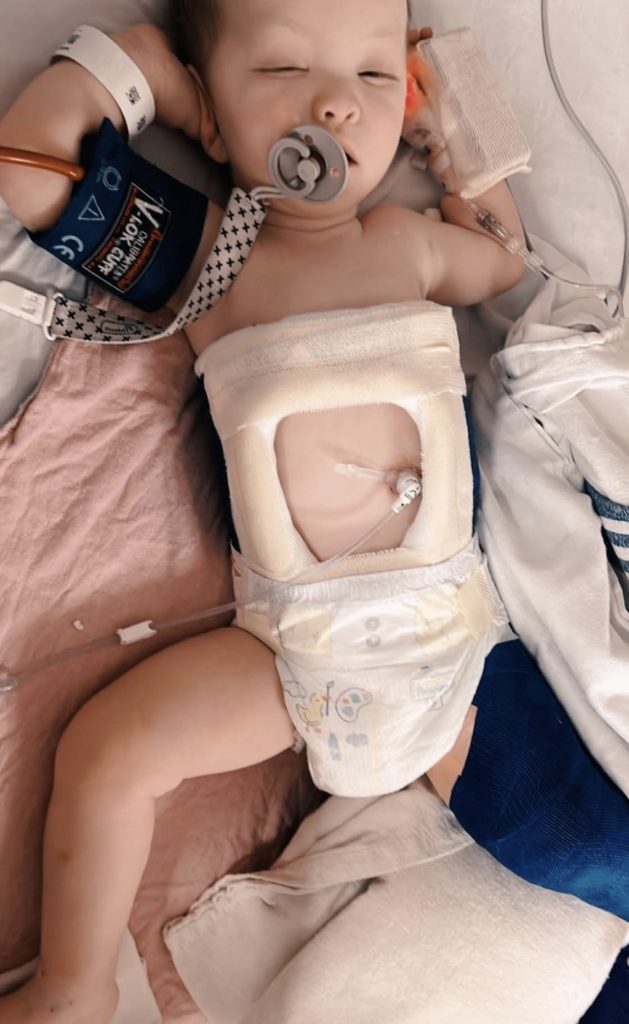
At age 1 year 10 months, Henley also underwent a lengthy 5-hour surgery for his hip. He had hip dysplasia surgery with a pelvic osteotomy (t pins inserted into the hip for proper angle and alignment). He was in a full body cast from his chest down to his ankle on one side, including a “window” for his G tube. We had to watch the cast wasn’t too tight, and we lived on a mattress in our living room for 6+ weeks. After surgery, Henley celebrated his 2nd birthday fresh out of a cast with limited movement and spent his day on the couch.
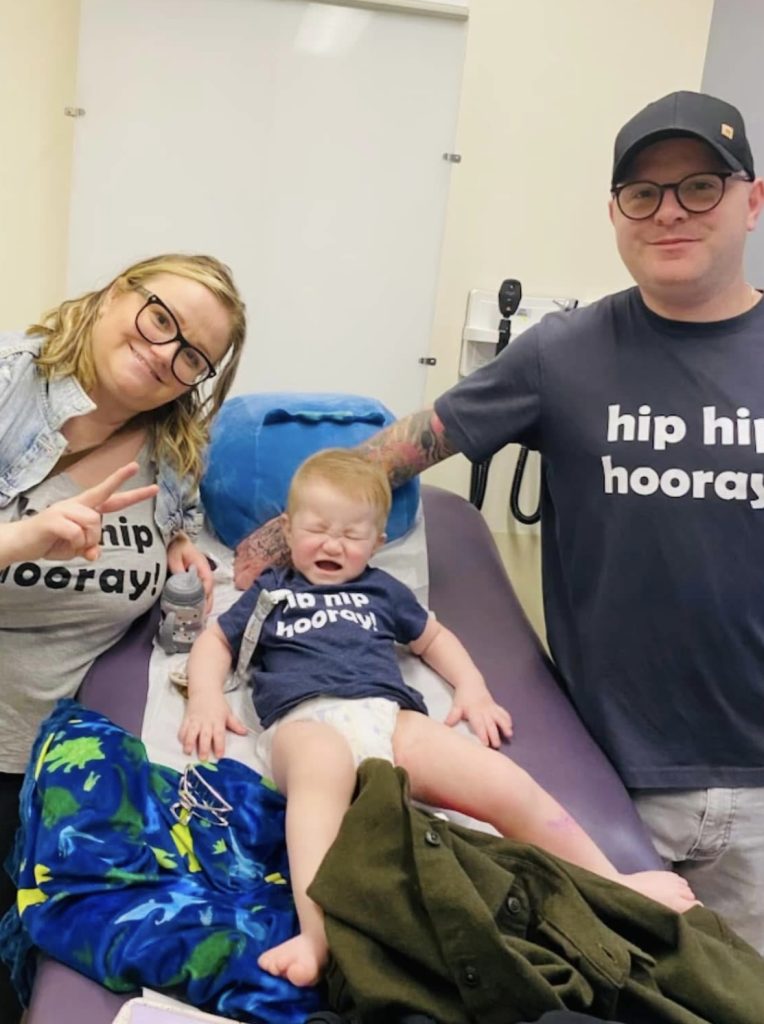
He had to learn to sit up again at age 2. He gained strength and eventually walked with his shopping cart and then independently. He couldn’t have physiotherapy for months after surgery, as his surgeon wanted him to access this care when he was ready for it. Henley is now walking independently and can walk up stairs with assistance. He is eating orally–a lot of “beige foods” and carbs–but he’s eating! His favourite foods are strawberries, popsicles, pizza and cheese and crackers.
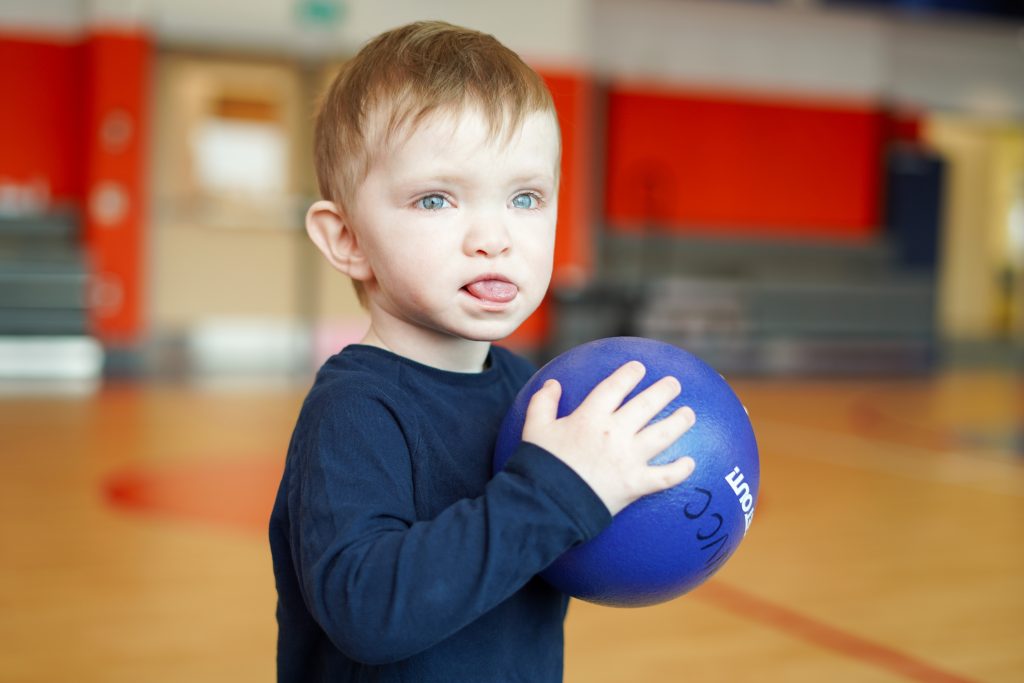
The entire journey, especially in the early days, was a blur. He has been through so much and come so far. Henley is now 3 years 5 months old, has started Nursery School and is thriving. He stims a lot with his autism spectrum disorder (ASD) and seems to enjoy the routine. We are amazed every day by our boy. He is non-verbal, developmentally delayed and has had a diagnosis of autism received through a developmental paediatrician at Grandview Kids.
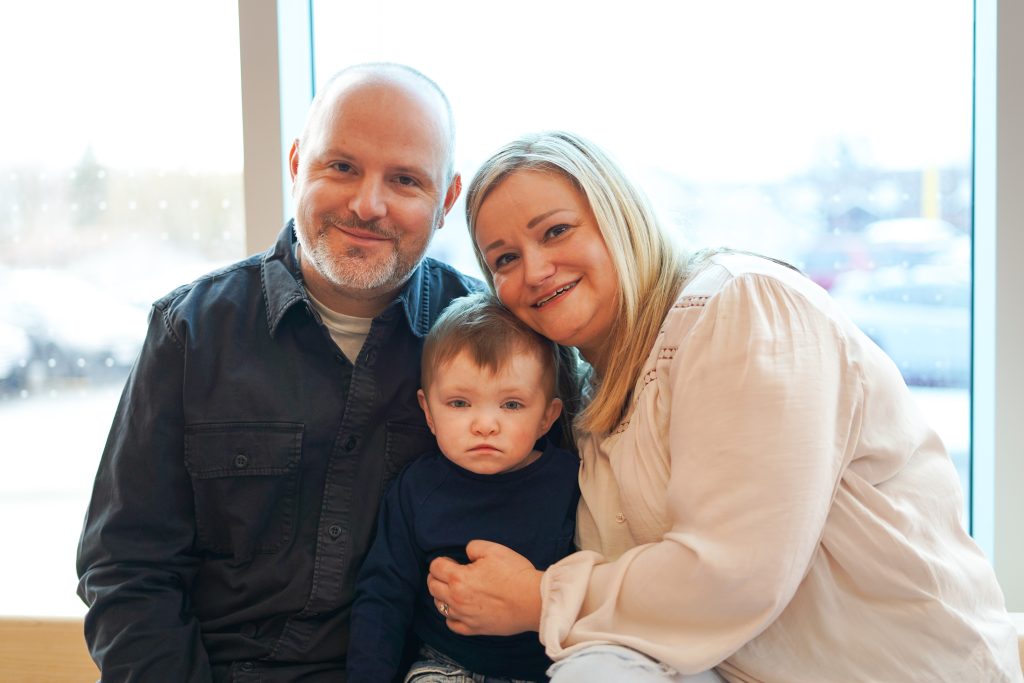
We are so proud of how far Henley’s come, especially when we share our story. I hope this helps anyone with a new genetic diagnosis, including Kabuki syndrome. You are not alone, and my best advice would be to reach out online, find support groups or others going through similar experiences, whatever that may be.
To show your support, I encourage you to wear green on October 23rd for Kabuki Syndrome Awareness Day!
Check out more Grandview Kids articles
- Celebrating Ahaana: Finding sound, strength and community on Cochlear Implant Day
- Navigating the intersection of disability and race as a caregiver: Honouring Black History Month
- Embracing hope through every challenge: Brock’s journey
- Jack’s resilience shines through every step: Rare Disease Day
- February: Dates of Significance
